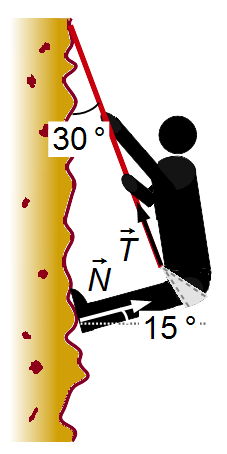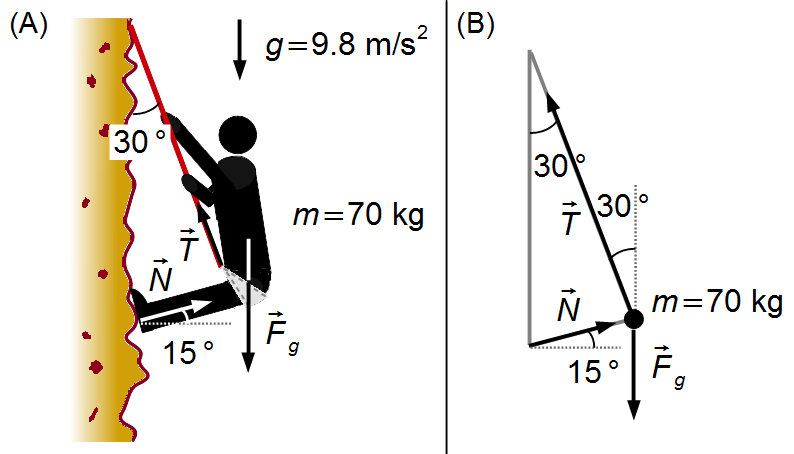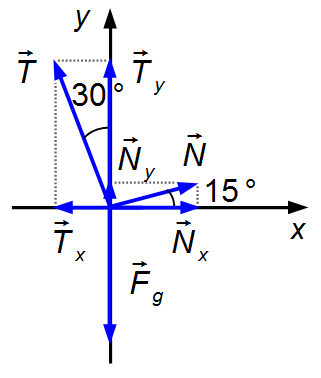Solved Problem on Static Equilibrium
advertisement
A climber, with a mass of 70 kg, at a certain moment, is stationary in the position shown in the figure.
Determine:
a) What is the magnitude of the tension in the rope?
b) What is the magnitude of the normal force exerted on the climber's feet?
a) What is the magnitude of the tension in the rope?
b) What is the magnitude of the normal force exerted on the climber's feet?

Problem data:
- Mass of the climber: m = 70 kg;
- Acceleration due to gravity: g = 9.8 m/s2.
The forces acting on the system are, the gravitational force \( {\vec F}_g \) of the climber, the tension force \( \vec T \) in the rope that supports the climber, and the normal reaction force \( \vec N \) from the wall on the climber (Figure 1-A).

The tension force makes a 30° angle with the vertical wall, drawing a vertical line that passes through the climber's position. The angle between the tension force and the vertical at the climber’s position is also 30°, as these are alternate angles (Figure 1-B).
Solution:
We draw the forces in an xy coordinate system and we decompose the forces in these directions (Figure 2).
The gravitational force
\( {\vec F}_g \)
only has a component in the negative y-direction. The tension force
\( \vec T \)
has a component
\( {\vec T}_x \)
in the negative x-direction and a component
\( {\vec T}_y \)
in the positive y-direction. The normal reaction force
\( \vec N \)
has a component
\( {\vec N}_x \)
in the positive x-direction and a component
\( {\vec N}_y \)
in the positive y-direction.
Since the system is in equilibrium, the resultant of the forces acting on it is equal to zero
Since the system is in equilibrium, the resultant of the forces acting on it is equal to zero
\[
\begin{gather}
\bbox[#99CCFF,10px]
{\sum\vec F=0}
\end{gather}
\]
\[
\begin{gather}
\vec T+\vec N+{\vec F}_g=0\\[5pt]
-{\vec T}_x+{\vec T}_y+{\vec N}_x+{\vec N}_y-{\vec F}_g=0 \tag{I}
\end{gather}
\]

- x-direction:
\[
\begin{gather}
T_x=T\sin 30° \tag{II}
\end{gather}
\]
Note: contrary to what is usually done, where the angle is measured relative to the
x-axis and the component in that direction is proportional to the cosine, here the angle was
measured relative to the y-axis, and the component is proportional to the sine of the angle.
The component of the normal reaction force in the x-direction is given by
\[
\begin{gather}
N_x=N\cos 15° \tag{III}
\end{gather}
\]
The gravitational force has no component in the x-direction.- y-direction:
\[
\begin{gather}
T_y=T\cos 30° \tag{IV}
\end{gather}
\]
The component of the normal reaction force in the y-direction is given by
\[
\begin{gather}
N_y=N\sin 15° \tag{V}
\end{gather}
\]
The gravitational force is given by
\[
\begin{gather}
\bbox[#99CCFF,10px]
{F_g=mg} \tag{VU}
\end{gather}
\]
Substituting equations (II), (III), (IV), (V), and (VI) into equation (I) and separating the components in
the x and y directions:
- x-direction:
\[
\begin{gather}
-T\sin30°+N\cos 15°=0
\end{gather}
\]
- y-direction:
\[
\begin{gather}
T\cos 30°+N\sin 15°-mg=0
\end{gather}
\]
From Trigonometry
\( \cos 30°=\dfrac{\sqrt{3\;}}{2}=0.8660 \),
\( \sin30°=\dfrac{1}{2}=0.5000 \),
\( \cos 15°=0.9659 \), \( \sin15°=0.2588 \).
\( \cos 15°=0.9659 \), \( \sin15°=0.2588 \).
\[
\begin{gather}
\left\{
\begin{array}{l}
-0.5000T+0.9659N=0\\
0.8660T+0.2588N-(70\;\mathrm{kg})\left(9.8\;\mathrm{\frac{m}{s^2}}\right)=0
\end{array}
\right. \\[10pt]
\left\{
\begin{matrix}
-0.5000T+0.9659N=0\\
0.8660T+0.2588N=686\;\mathrm N
\end{matrix}
\right.
\end{gather}
\]
That is a system of two equations with two unknowns (T and N). Solving the first equation for
T and substituting in the second equation
\[
\begin{gather}
-0.5000T+0.9659N=0 \\[5pt]
0.5000T=0.9659N \\[5pt]
T=\frac{0.9659}{0.5000}\;N \\[5pt]
T=1.9318N \tag{VII}
\end{gather}
\]
\[
\begin{gather}
0.8660\times1.9318N+0.2588N=686\;\mathrm N \\[5pt]
1.6729N+0.2588N=686\;\mathrm N \\[5pt]
N=\frac{686\;\mathrm N}{1.9318}
\end{gather}
\]
\[
\begin{gather}
\bbox[#FFCCCC,10px]
{N\approx 355.10\;\mathrm N}
\end{gather}
\]
substituting this value of the normal reaction force into equation (VII), we obtain the value of the
tension force
\[
\begin{gather}
T=1.9318\times 355.10\;\mathrm N
\end{gather}
\]
\[
\begin{gather}
\bbox[#FFCCCC,10px]
{T\approx 685.98\;\mathrm N}
\end{gather}
\]
advertisement

Fisicaexe - Physics Solved Problems by Elcio Brandani Mondadori is licensed under a Creative Commons Attribution-NonCommercial-ShareAlike 4.0 International License .